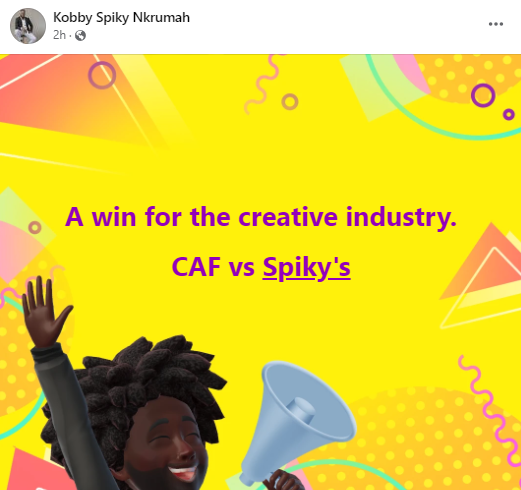In a landmark decision for the creative industry in Ghana, music producer Spiky (born Kwabena Ofei-Kwadey Nkrumah) has won a significant legal battle against the Confederation of African Football (CAF) over copyright infringement. The Commercial Court 7 in Accra delivered its verdict on Wednesday, July 17, 2024, finding CAF guilty of unauthorized use of Spiky’s music.

The Case and Verdict
The court, presided over by Justice Emmanuel Loddoh, ruled that CAF had infringed on Spiky’s copyright by using the beat from his track “Okomfo Anokye” in promotional materials for the 2018 CAF awards without seeking permission. As a result, CAF has been ordered to pay damages equivalent to USD 250,000 and legal costs of GHS 40,000.
Background of the Dispute
Spiky first raised the issue in 2019 through a series of tweets, accusing CAF of copyright infringement. Despite CAF’s admission of using the work without consent and their subsequent apology, they failed to respond to Spiky’s demand for compensation, leading to the legal action.
CAF’s Defense
In their defense, CAF claimed that the musical work was “available online for free download without any restrictions or conditions.” They also argued that the CAF Awards was not a profit-making venture and that they had removed the work from their social media platforms upon realizing the infringement.
Implications for the Creative Industry
This verdict represents a significant win for artists and producers in Ghana and potentially across Africa. It underscores the importance of respecting intellectual property rights and the potential consequences of unauthorized use of creative works, even by major organizations.

Spiky’s Reaction
Expressing his excitement on social media, Spiky, who is also known as a tech expert, celebrated the verdict as “A win for the creative industry: CAF vs Spiky’s.” This statement highlights the broader implications of the case for creators across various fields.
Looking Forward
This case sets a precedent for how copyright infringement cases might be handled in Ghana and potentially in other African countries. It serves as a reminder to organizations to be diligent in obtaining proper licenses for creative works, even when they are freely available online. For artists and producers, it reinforces the importance of protecting their intellectual property and pursuing legal action when necessary.
As the creative industry continues to evolve in the digital age, this verdict may encourage more robust discussions about copyright laws, fair use, and the value of creative works in the African context.


